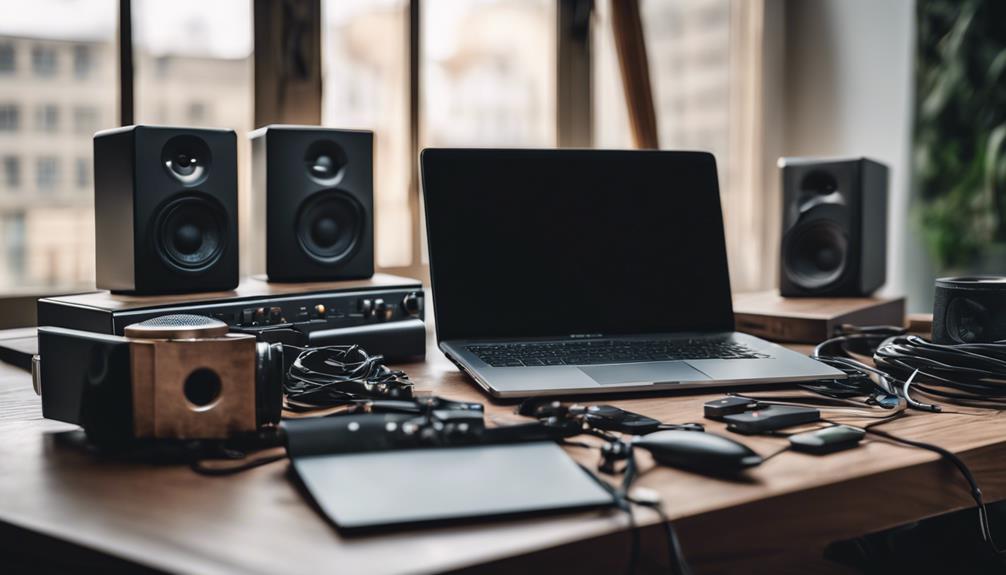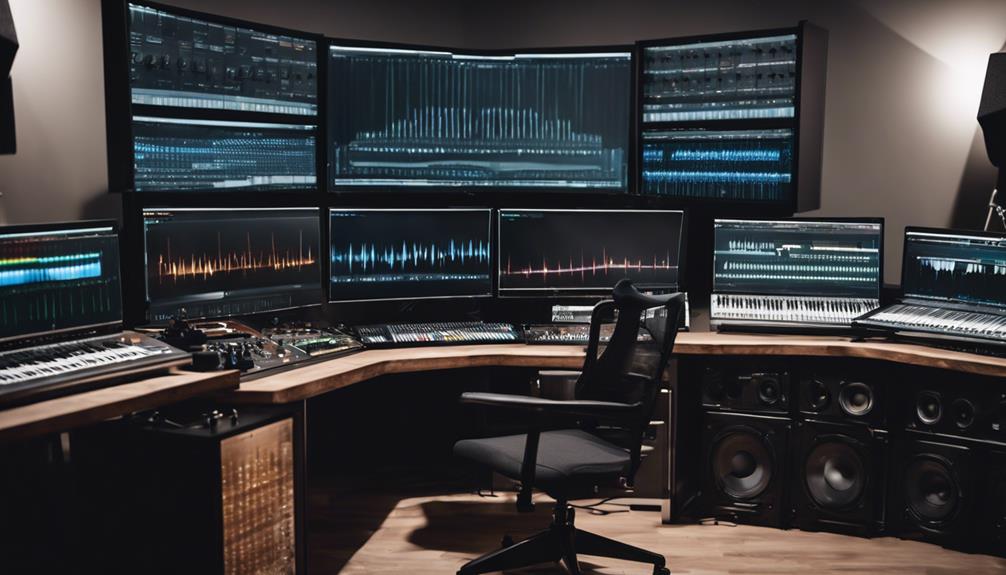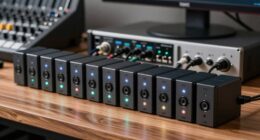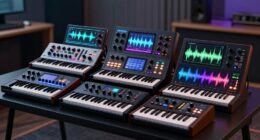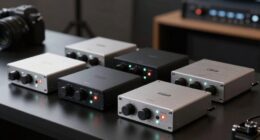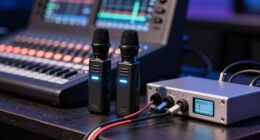To take my music production skills to the next level, I focus on developing creative habits, mastering music theory fundamentals, and refining technical skills in mixing and mastering. I prioritize practical advice, selecting resources that offer actionable steps for improvement. By understanding genre-specific techniques, I craft unique sounds and tailor my approach to each style. With a strong foundation in music theory, I make informed decisions about scales, chords, and melody structures. By overcoming mental barriers and staying motivated, I optimize my workflow and create professional-sounding tracks. Now, I'm ready to dive deeper into the world of music production and uncover more secrets to take my tracks to the next level. I constantly seek to enhance my process by incorporating essential music production workflow tips that streamline my creativity and efficiency. These tips help me stay organized, maintain focus, and make the most of my studio time. By blending structured techniques with experimentation, I ensure that each track evolves with a balance of technical precision and artistic expression.
Key Takeaways
- Develop a selective approach to learning, focusing on essential concepts and techniques to build confidence and improve workflow efficiency.
- Establish a strong music theory foundation to craft harmonious compositions, arrangements, and make informed production decisions.
- Prioritize practical advice with actionable steps for improvement, addressing common challenges faced by music producers for real-world results.
- Optimize the creative process by incorporating effective practice sessions, correct technique, and mindfulness practices like yoga and meditation.
- Focus on genre-specific techniques, sound design, and mixing decisions to craft a unique sound that represents the energy and elements of each musical style.
Music Habits: Electronic Music Production

If you're an electronic music producer struggling to turn your creative vision into a tangible product, 'Music Habits: Electronic Music Production' is the perfect resource to help you overcome mental and psychological barriers holding you back from producing high-quality tracks.
This book doesn't just focus on the technical aspects of music production; instead, it dives deeper into the mental and psychological aspects that can make or break your creative process. By emphasizing the importance of creative habits and the mental game in music making, 'Music Habits' provides a rejuvenating approach to electronic music production.
The book's selective approach to learning and emphasis on core concepts will help you build confidence, stay focused, and avoid information overload. With its practical advice and timeless concepts, 'Music Habits' is an essential tool for any electronic music producer looking to improve their workflow, work ethic, and overall productivity.
Best For: Electronic music producers who want to overcome mental and psychological barriers to produce high-quality tracks.
Pros:
- Emphasizes the importance of creative habits and the mental game in music making, providing a unique approach to electronic music production.
- Offers practical advice and timeless concepts that can be applied to any genre, making it a valuable resource for producers.
- Provides a selective approach to learning, helping producers build confidence and stay focused without feeling overwhelmed by excessive information.
Cons:
- May not be suitable for producers who are looking for a technical guide to electronic music production.
- Some producers may find the emphasis on mental and psychological aspects of music production to be too introspective or unconventional.
- The book's focus on creative habits and mental game may not provide immediate solutions for producers who are struggling with specific technical issues.
The Secrets of Dance Music Production

If you're an aspiring dance music producer looking to elevate your skills from basic to professional, 'The Secrets of Dance Music Production' is the ultimate guide for you, offering a thorough and well-structured approach to mastering the art of electronic music production.
This book covers a wide range of topics, from percussion to synthesis and music theory, making it suitable for both beginners and intermediate level producers.
With its wealth of practical tips, quality examples, and graphics, I found it particularly helpful in correcting bad habits and expanding my production skills.
The book's focus on dance music as an umbrella term for various genres that make people dance is also invigorating, as it encourages experimentation and creativity.
Overall, 'The Secrets of Dance Music Production' is a valuable resource that provides a detailed and accessible guide to electronic music production.
Best For: Aspiring dance music producers looking to improve their skills and knowledge in electronic music production.
Pros:
- Covers a wide range of topics, from percussion to synthesis and music theory, making it suitable for both beginners and intermediate level producers.
- Offers practical tips, quality examples, and graphics that aid comprehension and provide hands-on practice.
- Structured to cover theory, sound design, mixing, and mastering, providing a comprehensive guide to electronic music production.
Cons:
- May not be suitable for advanced producers who are already familiar with the concepts and techniques covered in the book.
- Some readers may find the book's focus on dance music production limiting, as it may not cover other genres of music production.
- The book's comprehensive coverage of electronic music production may be overwhelming for some readers who are new to the subject.
The Art of Practicing: A Guide to Making Music from the Heart

For musicians seeking to tap into their full creative potential, 'The Art of Practicing: A Guide to Making Music from the Heart' is a game-changing resource that offers a holistic approach to music practice, delving into the intersection of technique, physiology, and mindfulness.
This book provides practical advice on effective practice sessions, making it easy to follow and filled with valuable information. I've found that it emphasizes the importance of correct technique for better performance, helping me understand the physiological aspects of playing an instrument.
By incorporating concepts like yoga and meditation, I've noticed improvements in my practice sessions and a more compassionate relationship with music and performance. Overall, this book is a must-read for musicians and performers looking to take their craft to the next level.
Best For: Musicians and performers seeking to improve their practice techniques and develop a more holistic approach to making music.
Pros:
- Provides practical advice on effective practice sessions, making it easy to follow and filled with valuable information.
- Emphasizes the importance of correct technique for better performance, helping readers understand the physiological aspects of playing an instrument.
- Incorporates concepts like yoga and meditation, leading to improvements in practice sessions and a more compassionate relationship with music and performance.
Cons:
- May not be suitable for beginners who are still learning the basics of their instrument.
- Some readers may find the incorporation of yoga and meditation concepts to be unconventional or not relevant to their practice.
- The book's approach may not be applicable to all genres of music or performance styles.
Step By Step Mixing: How to Create Great Mixes Using Only 5 Plug-ins

Those of us struggling to achieve professional-sounding mixes will find this step-by-step mixing guide particularly useful, as it breaks down the process into manageable chunks using just five essential plug-ins.
I've found that this guide is perfect for those who've been mixing for a while but are still unsatisfied with their results. It's not suitable for absolute beginners, as it assumes a basic understanding of digital audio workstations (DAWs) and fundamental mixing tasks.
What I like about this guide is its focus on clear concepts and workflow-oriented examples, making it easy to follow and implement in my own mixing workflow. The guide is concise and practical, providing valuable information without unnecessary fluff or boring stories.
While some may find the audio version's narration and quality lacking, the content itself is solid and to the point. Overall, this guide is a great resource for taking my mixes to the next level.
Best For: Those who have some experience with mixing but are still unsatisfied with their results and want to improve their skills using a simple and practical approach.
Pros:
- Provides clear and concise concepts and workflow-oriented examples that are easy to follow and implement in your own mixing workflow.
- Offers valuable and practical information without unnecessary fluff or boring stories, making it a great resource for taking your mixes to the next level.
- Assumes a basic understanding of digital audio workstations (DAWs) and fundamental mixing tasks, making it suitable for those who have some experience but want to improve their skills.
Cons:
- Not suitable for absolute beginners, as it assumes a basic understanding of digital audio workstations (DAWs) and fundamental mixing tasks.
- The audio version's narration and quality have been criticized by some reviewers.
- May not be suitable for professionals or experienced amateurs who are looking for more advanced techniques and strategies.
Music Production For Beginners Guide

As a newcomer to music production, I've found that a thorough guide specifically tailored for beginners is essential, and that's exactly what this 'Music Production For Beginners Guide' provides, offering a well-rounded introduction to the industry and its core concepts.
This all-encompassing guide covers everything from choosing the right programs to setting up a home studio, and even provides valuable insider tips on exploring the industry. What I appreciate most is that it's written in a way that's easy to understand, making it perfect for those just starting out.
Of course, no guide is perfect, and some reviewers have mentioned that the book could improve on its flow and consistency, as well as providing more detailed instructions on music production techniques. Nevertheless, this guide is a great resource for beginners looking to gain a solid foundation in music production.
Best For: Beginners looking to gain a solid foundation in music production.
Pros:
- The guide is well-written and easy to understand, making it perfect for those just starting out in music production.
- Provides a comprehensive look into music production basics and the industry, covering topics like choosing programs, setting up a home studio, and adapting to industry changes.
- Offers valuable insider tips on navigating the industry, drawn from the author's husband's experience in the underground DJ scene.
Cons:
- Some reviewers have mentioned that the book lacks flow and consistency in its voice, possibly due to aggregated information.
- The guide has been criticized for having spelling issues and overly simplistic instructions on music production techniques.
- A few reviewers have expressed disappointment that the book appears to be a copy and paste compilation, lacking originality.
How to Make It in the New Music Business

As I explore the world of music production, I've come to realize that making it in the industry takes more than just creating great music. Anyone looking to turn their passion into a career will find 'How to Make It in the New Music Business' an invaluable resource, offering practical tips and inspiration to help them navigate the industry successfully.
This book provides a thorough guide on building a loyal following, making a living as a musician, and adapting to changes in the industry. From song and album release plans to marketing, managers, shows, touring, and artwork/media, it covers all aspects of the music business.
With its emphasis on hard work, planning, and adapting to changes, this book is a must-read for indie musicians looking to make music a full-time career.
Best For: Indie musicians looking to make music a full-time career.
Pros:
- Provides practical tips and inspiration for navigating the music industry successfully
- Covers all aspects of the music business, from song and album release plans to marketing and touring
- Emphasizes the importance of hard work, planning, and adapting to changes in the industry
Cons:
- Some readers note that the book is more useful for musicians in the United States than in Europe
- No other significant drawbacks mentioned by readers
- No other significant drawbacks mentioned by readers
Loop Engage Earplugs for Conversation

When I need to focus on conversation in noisy environments, I rely on Loop Engage Earplugs for Conversation, which provide low-level noise reduction while preserving clear speech. These earplugs are specifically designed for social gatherings, noise sensitivity, and parenting, making them an essential tool for anyone who wants to engage with their surroundings without being overwhelmed by loud noises.
With their innovative acoustic channels and newly-engineered filters, they offer echo-free speech and address the occlusion effect, guaranteeing that I can hear conversations clearly without feeling like I'm stuck in a tunnel.
I've found that the earplugs are comfortable to wear for extended periods, even for 3-4 hours, and come with eight ear tip sizes to ensure a perfect fit. The carry case is a nice touch, keeping them safe and clean when not in use.
While they may take some getting used to, the benefits are well worth the investment. Whether I'm in a loud classroom, STEM lab, or just trying to sleep through a snorer, Loop Engage Earplugs for Conversation have been a game-changer for me.
Best For: Individuals who need to focus on conversation in noisy environments, such as social gatherings, noise sensitivity, and parenting, and want a comfortable and discreet solution.
Pros:
- Provides low-level noise reduction while preserving clear speech, making it ideal for conversations in noisy environments.
- Comfortable to wear for extended periods, with eight ear tip sizes to ensure a perfect fit.
- Durable and reusable, with a practical carry case for safe storage.
Cons:
- May take some time and practice to achieve a comfortable and proper fit.
- Some users may find the value for money to be mixed, depending on their individual needs and expectations.
- Not suitable for complete noise cancellation, but rather for reducing background noise while maintaining clear speech.
How To Make It in the New Music Business

If you're an aspiring musician looking to turn your passion into a lucrative career, 'How to Make It in the New Music Business' is the ultimate guide to help you navigate the industry's ever-changing landscape. This book is a treasure trove of practical advice, covering everything from songwriting to monetizing your music.
The author's credibility shines through in their detailed industry insights and creative ideas, making the book a must-read for anyone serious about succeeding in the music business.
With its engaging and informative content, 'How to Make It in the New Music Business' has already helped numerous musicians improve their careers, and I'm confident it can do the same for you.
Best For: Aspiring musicians looking to turn their passion into a lucrative career.
Pros:
- Provides comprehensive insights into the music industry, covering various aspects from songwriting to monetizing music.
- Offers practical advice and creative ideas from an experienced and credible author.
- Engaging and informative content that has already helped numerous musicians improve their careers.
Cons:
- Some self-promotion by the author, although it does not detract from the overall value of the book.
- May not be suitable for musicians who are already well-established in the industry.
- No specific cons mentioned in the review, but some readers may not find the book applicable to their specific situation.
Song Mixing Secrets: Music Production Secrets

As a novice music producer, I found 'Song Mixing Secrets: Music Production Secrets' to be an invaluable resource, offering practical advice and techniques that I could immediately apply to my song projects to improve their overall quality.
The book's well-structured and thought-out approach made it easy to follow and understand, even for someone new to the world of music production. I appreciated the direct and to-the-point style, which provided valuable insights and fixes for common mixing problems.
By applying the techniques learned from this book, I was able to boost my confidence in engineering my own mixes and achieve cleaner and richer mixes. Overall, 'Song Mixing Secrets' is a great resource for anyone looking to improve their music production skills, especially for those just starting out.
Best For: Novice music producers and those new to the world of music production who want to improve their song mixing skills.
Pros:
- Provides practical advice and techniques that can be immediately applied to song projects to improve music quality.
- Offers a well-structured and thought-out approach that is easy to follow and understand.
- Boosts confidence in engineering own mixes and achieving cleaner and richer mixes.
Cons:
- May lack depth for more experienced music producers.
- Some readers may find repetition from other books in the series.
- Coverage of content may not be as comprehensive as some readers may expect.
Teach Yourself to Play Guitar: A Quick and Easy Introduction for Beginners

As a beginner, I've found that 'Teach Yourself to Play Guitar: A Quick and Easy Introduction for Beginners' is the perfect choice for those who want to learn the basics of guitar playing through tab format, which is ideal for visual learners and those who struggle with traditional music notation.
This book covers all the essentials, including chords, position chords, chord patterns, and correct hand positions, making it easy to follow and understand. The spiral binding is also a thoughtful touch, allowing the book to lie flat and making it easy to focus on learning.
I've found that the step-by-step approach makes it simple to learn and progress quickly, even for absolute beginners. Overall, I highly recommend this book as a great starting point for anyone looking to teach themselves to play guitar.
Best For: Beginners who want to learn the basics of guitar playing through tab format.
Pros:
- Teaches all the basics of guitar playing, including chords, position chords, chord patterns, and correct hand positions.
- Easy to follow and understand, with a step-by-step approach that makes it simple to learn and progress quickly.
- Spiral binding allows the book to lie flat, making it easy to focus on learning.
Cons:
- Not suitable for those who want to learn traditional music notation.
- Lacks useful content beyond showing finger positions for chords.
- May not meet expectations for those who are looking for more advanced material.
Musicians Survival Guide to a Killer Record

As I explore the world of music production, I've come to realize that 'Mixerman's Musicians Survival Guide to a Killer Record' is an indispensable resource for any musician looking to take their tracks to the next level. This book is packed with practical tips and expert insights that can transform demos into chart-topping hits.
What sets it apart is its ability to provide valuable advice on how to identify and correct common mistakes in music recordings, emphasizing the importance of capturing inspired performances and focusing on the essence of music production.
With its detailed index, easy-to-understand language, and practical advice, this book has been praised by readers for its ability to inspire and improve their music production skills. By following Mixerman's guidance, musicians can create high-quality recordings that stand out in the industry.
Best For: Musicians at all levels, from beginners to experienced professionals, looking to improve their music production skills and create high-quality recordings.
Pros:
- Provides valuable insights and practical tips for creating high-quality music recordings
- Offers a detailed index, easy-to-understand language, and practical advice on music production
- Helps musicians identify and correct common mistakes in music recordings, emphasizing the importance of capturing inspired performances and focusing on the essence of music production
Cons:
- None mentioned in the provided facts
12-String Guitar Transcriptions

When it comes to mastering the 12-string guitar, beginners and intermediate players alike will find the extensive transcriptions of popular tunes from iconic bands like The Beatles, The Eagles, and Queen to be an invaluable resource.
These transcriptions cover a range of songs, including 'All Of My Love' by the Eagles, and provide detailed instructions to help you learn and improve.
While some users have noted that the book may lack descriptions and details, particularly when it comes to tuning and capoing, I've found that the quality of the book and service make it a valuable addition to any music collection.
With its ease of use and helpful lessons, this book is perfect for those who've recently acquired a 12-string guitar and are looking to develop their skills.
Best For: Beginner and intermediate 12-string guitar players looking to learn and improve their skills with popular tunes from iconic bands.
Pros:
- Covers a range of popular songs from iconic bands like The Beatles, The Eagles, and Queen
- Provides detailed instructions to help learn and improve
- Easy to use and helpful for beginners who have recently acquired a 12-string guitar
Cons:
- Lacks descriptions and details, particularly when it comes to tuning and capoing
- May not meet the expectations of experienced musicians seeking authentic versions of songs
- Inaccuracies in finger placements and organization of transcriptions have been reported
Donner DMK25 Pro MIDI Keyboard Controller

For musicians seeking a compact and feature-rich MIDI keyboard controller, the Donner DMK25 Pro stands out with its 25 mini keys, 8 drum pads, and OLED display, making it an ideal choice for producers on-the-go.
As a music producer, I appreciate the personalized touch bar and innovative wheels that provide visual control, allowing me to concentrate on creating music rather than maneuvering through complex interfaces.
The intelligent dynamic scale mode and real-time multi-mode control features are also impressive, although some users have reported issues with their functionality.
Despite this, the Donner DMK25 Pro's compatibility with various DAW software and inclusion of 40 free keyboard-teaching courses make it a great value for its price.
Overall, this MIDI keyboard controller is a solid choice for musicians looking to take their productions to the next level.
Best For: Musicians and producers who need a compact, feature-rich MIDI keyboard controller for music production on-the-go.
Pros:
- Compact and lightweight design with 25 mini keys, 8 drum pads, and OLED display
- Personalized touch bar and innovative wheels provide visual control and improve workflow
- Compatible with various DAW software and includes 40 free keyboard-teaching courses
Cons:
- Some users have reported issues with the functionality of certain features, such as scale mode and chord functionality
- Mixed reviews on ease of use and functionality for beginners
- Some users have reported issues with the build quality and materials used
The Organized Songwriter: How to Create Space to Write Your Best Songs

Crafting hit songs requires more than just inspiration – it demands a systematic approach, making 'The Organized Songwriter' a game-changer for aspiring musicians seeking to streamline their creative process and produce their best work.
As a songwriter, I've found that staying organized is key to writing efficiently and effectively. This book provides practical advice on creating space to write, helping me to prioritize my ideas and stay focused.
The author, Simon Hawkins, draws on his corporate background to offer insight into songwriting methods, emphasizing the importance of organization for successful songwriting. With its accompanying workbook, audiobook, and journal, 'The Organized Songwriter' is an all-encompassing resource that has helped me transform my songwriting process and increase my productivity.
Best For: Songwriters looking to enhance their organizational skills and craft, particularly those struggling with finishing songs or seeking guidance on improving their creative process.
Pros:
- Provides practical advice on creating space to write and staying organized, leading to increased productivity and efficiency in songwriting.
- Offers a comprehensive resource with accompanying workbook, audiobook, and journal, making it a valuable tool for aspiring songwriters.
- Draws on the author's corporate background to offer unique insights into songwriting methods, emphasizing the importance of organization for successful songwriting.
Cons:
- Some readers have mentioned religious references in the content that seem out of place.
- The book's structure has been criticized for including off-topic musings and common-sense tips.
- Some readers have found the book's content to be not entirely groundbreaking, with some tips being considered obvious or intuitive.
Audio Mastering Secrets

If you're a DIY musician or professional producer looking to elevate your sound to commercial standards, 'Audio Mastering Secrets' is the ultimate guide to help you refine your skills and produce polished, radio-ready tracks.
This book is packed with valuable tips and knowledge that you won't find in many other resources. The author's enthusiasm and dedication to sharing their expertise shine through in the easy-to-follow, step-by-step instructions on mastering music.
From mastering compression and EQ to spectral enhancement and fixing common mix problems, this book covers it all. I especially appreciate the insights into mastering different music genres and commercial volume settings, as well as the step-by-step mastering session for beginners.
Whether you're a seasoned pro or just starting out, 'Audio Mastering Secrets' is a must-read for anyone looking to take their audio mastering skills to the next level.
Best For: DIY musicians and professional producers looking to elevate their sound to commercial standards.
Pros:
- Provides valuable tips and knowledge not found in many other resources
- Offers easy-to-understand, step-by-step instructions on mastering music
- Covers a wide range of topics, including mastering compression, EQ, spectral enhancement, and fixing common mix problems
Cons:
- Some readers find the author's self-assurance and credibility assertions slightly repetitive
- The author's style is seen as slightly egocentric by some readers
- Initial skepticism from some readers, but ultimately appreciated for its informative content
Factors to Consider When Choosing Music Production Tips

When it comes to choosing music production tips, I've learned that it's crucial to be selective. Not all tips are created equal, and considering a few key factors can make all the difference in getting the most out of them.
From the books I choose to the authors' credentials, I've found that being mindful of these details helps me separate the wheat from the chaff and focus on tips that truly help me improve my craft.
Book Choices Matter
I've found that selecting the right music production book is essential, as it can greatly impact my learning experience and skill development. When choosing a book, I consider the relevance and focus of the content to my music production goals. I look for practical tips, techniques, and strategies tailored to my skill level, whether I'm a beginner or an advanced producer.
Reader reviews and testimonials are also vital, as they give me an idea of the book's effectiveness and impact. I evaluate the author's expertise and background in music production to confirm credibility. A well-organized and clear book is also crucial, making it easy to understand and apply the concepts.
I've learned that different books offer varying levels of detail, expertise, and focus on specific aspects of music production. By considering these factors, I can choose a book that covers a wide range of topics, from beginner to advanced techniques, ensuring a well-rounded understanding of music production.
Ultimately, my choice of music production book shapes my knowledge, techniques, and overall approach to creating music. By making an informed decision, I can take my tracks to the next level.
Genre Specific Tips
One essential aspect of music production is acknowledging that different genres require distinct approaches, and understanding these genre-specific techniques is important for crafting a unique sound that resonates with your target audience.
For instance, electronic music often relies heavily on synthesizers, while hip-hop emphasizes intricate drum patterns. Jazz, on the other hand, focuses on live instrumentation and improvisation, whereas country music production typically involves acoustic instruments like guitars and fiddles, with a strong emphasis on storytelling through lyrics.
Rock music can vary greatly, from raw and gritty to polished and layered, depending on the subgenre and artistic vision. By understanding the characteristics of each genre, I can tailor my sound design and mixing decisions to effectively capture the essence of the music.
This knowledge also helps me apply genre-specific mastering techniques to achieve the desired sound quality. By considering these factors, I can create tracks that truly represent the unique elements and energy of each musical style.
Author Credentials Count
When assessing the vast landscape of music production tips, I realize that the credibility of the author is a critical factor in determining the value of their advice. Examining the author's background in music production, education, or industry experience is crucial for gauging the credibility of their tips. Have they collaborated with notable musicians, artists, or industry professionals? Do they've a proven track record of successful music production, mastering, or teaching? Have they authored other well-received books, articles, or resources in the music production field?
These credentials indicate a level of expertise in music production, and I'm more likely to trust their advice.
I also seek out authors with affiliations to reputable music production schools, studios, or organizations, as they often provide valuable insights and practical tips. Even awards or recognition in the music industry can validate an author's expertise.
Practical Advice Preferred
When it comes to choosing music production tips, I prioritize practical advice that offers actionable steps for improvement. It's the most effective way to enhance my skills, workflow, and efficiency in music production.
I'm not interested in vague suggestions or theoretical concepts that don't translate to real-world results. Instead, I look for tips that provide specific techniques, strategies, and tools to help me achieve my production goals.
I want to know exactly what I can do to improve my craft, and I want to be able to implement those changes immediately. I also consider tips that address common challenges faced by music producers, as these often provide valuable solutions that can be easily implemented.
Music Theory Foundation
I prioritize music production tips that build upon a solid music theory foundation, as it's essential for crafting harmonious compositions and arrangements that resonate with my audience.
Understanding scales, chords, intervals, and rhythm is vital for structuring and enhancing musical elements. Music theory provides a framework for understanding chord progressions, scales, and melody structures, allowing me to make informed decisions during the production process.
It's the foundation upon which I can create melodies, harmonies, and rhythms that engage and are memorable. A solid music theory foundation also influences my choice of instruments, key signatures, and the overall mood of a music production.
By applying music theory in production, I can elevate the quality and depth of my music, leading to more engaging and memorable tracks. It's not about being a music theory expert, but having a solid grasp of the basics can enhance my creativity and allow me to experiment with different musical elements effectively.
Real-Life Applications
Several key factors come into play when choosing music production tips, including workflow efficiency, sound quality, and creative process optimization, all of which can greatly impact the real-life applications of these tips.
By implementing the right tips, I can create professional-sounding tracks, increase my productivity, and better manage my projects. These tips also help me overcome creative blocks, maintain motivation, and achieve a more polished final product.
Moreover, they aid in successful collaborations, better time management, and a more satisfying and fulfilling music-making experience. I've found that understanding music production techniques leads to a more efficient workflow, better collaboration with artists, and increased creativity in the studio.
Frequently Asked Questions
What's the Best Way to Organize My Samples and Presets?
"Honestly, I used to struggle with sample and preset organization, but now I use a clear folder structure and consistent naming conventions, making it easy to find what I need in seconds!"
Can I Produce Music Without Formal Music Theory Knowledge?
Honestly, I've produced tracks without formal music theory knowledge, and they still sound great. While theory helps, it's not a requirement – I've learned through experimentation and ear training, and you can too
How Do I Create a Unique Sound in a Saturated Genre?
"I stumbled upon an eerie ambient sample while cleaning my attic, which sparked an idea – what if I fused it with a trap beat? That's how I created a unique sound in a saturated genre, by embracing the unexpected."
What's the Ideal Room Setup for Music Production and Mixing?
"When I'm setting up my room for music production and mixing, I prioritize acoustic treatment, Invest in soundproofing materials, and strategically place my monitors and speakers to minimize echo and distortion."
Can I Still Make a Hit Song With Low-End Equipment?
"Can a masterpiece be born in a humble abode? Absolutely You don't need a lavish studio to create a hit; I've crafted bangers on a laptop and a pair of $50 speakers. It's about the music, not the gear."
Conclusion
So, you've made it through the 15 pro music production tips. Congrats! Now, go forth and produce some decent tracks, because let's be real, your excuse for not making great music just got demolished. With these tips in your arsenal, there’s no better time to dive in and turn your ideas into reality. Remember, having the right tools and environment is just as crucial as your creativity, so take the time to set up your workstation properly. If you’re a PC user, exploring the best Windows 10 versions for music production can make all the difference in optimizing your workflow and performance. Don’t forget, workflow efficiency plays a huge role in keeping your creativity flowing, so consider upgrading your gear to streamline the process. For instance, investing in the best trackballs for music production can significantly enhance precision and ease, especially during those long editing sessions. With everything in place, you’re all set to bring your sonic visions to life and create something truly extraordinary.
Don't thank me, thank your future fans who'll actually listen to your stuff. Remember, practice doesn't make perfect, perfect practice makes habit, and habit makes a killer track.
Now, stop reading and start producing.


